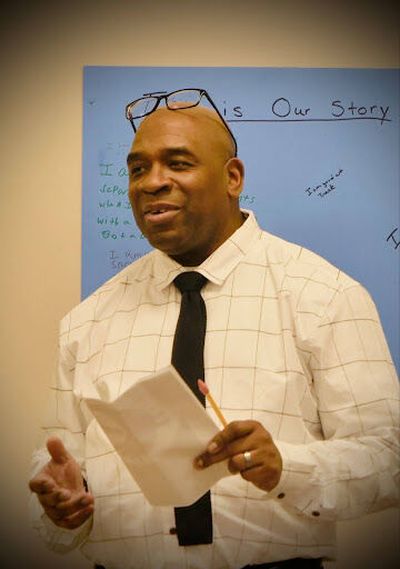The Black Lens
James Alexander is a school community/behavior intervention specialist who has been in education for nearly 25 years, with an education background in developmental and applied psychology. He currently serves on the Board of Directors for Washington Education Association. This year, two programs that support educators of color will be available through the union Spokane Education Association: Nakia Academy and Cami Institute. Each of these programs provide learning that will help Black educators lead in coaching and mentorship while providing common ground and a safe space to unpack some of the unique challenges faced as professionals in public education.
“Nakia is this community that was created, so that people of color in the education field have a community that they can go and talk to about the issues that arise being in education.” Alexander understands how low (or no) representation in schools among staff of color can feel awkward, uncomfortable and even strained. He acknowledges, “as people of color, if we seem to make waves, there’s always this backlash that takes place by just having conversations in the communities. So, then they get targeted and deemed as a problem person in the building.”
Not uncommon, reflects Alexander, is when Black people take a stance on matters, there is an undercurrent of rejection that can play out, and unwanted consequences become warning signs for people to be quiet or go along with the program to avoid conflict.
“There are so many people who have been somehow just moved to another building, you know, without choice in the matter because they may have said something or brought something to attention,” he said.
Among the things focused on in Nakia Academy is helping BIPOC educators navigate the tricky professional terrain by processing through strategies that support advocacy. This in turn, helps them become coaches for others experiencing similar things.
“One of the things that’s super important is not about just looking externally at what goes on; I’ve seen that (the program) makes you look internally first.”
Prejudice and bias, how we respond to them, in the essence of becoming stronger educators, is paramount.
Nakia gives people a space to talk, often releasing some of the negative experiences. This inspires a sense of catharsis and bravery to address matters they are often expected to suppress.
“It’s a support system,” Alexander said. “It is important, because you have the opportunity to go and share situations and circumstances and see how other people in the district have been able to successfully navigate through that and bring about change.”
The need for safe spaces can be a morale booster for educators of color who placate their own feelings in the name of professional survival. That is the value of Nakia Academy. Completing Nakia Academy certifies staff as highly qualified OSPI Beginning Education Support Team (BEST) mentors.
Cami Institute is a similar program geared toward different employee categories that work within the school system, particularly education support specialists, or ESPs. These are educators who support certificated teachers, and collaboration is a key part of how they do their jobs.
“This is a course where you have a lot of different people,” he said. “And it brings everybody in the same room on equal ground that says, OK, we don’t care about your title here.”
Like Nakia, Cami examines the weight of bias and frames it in the context of how to become an effective mentor and coach.
“The genuine side of education is how you show up in the classroom,” Alexander said.
Cami helps professionals understand situational awareness. Alexander shared it’s, in part, a self-reflective journey that empowers staff to use their voice by building skills, vocabulary and strategies to work through professional relationships. Another goal: building critical mass.
“It brings unity,” Alexander said. “When you have pockets of people in different places, and you don’t know who’s who … the key in the program is to bring everybody together so that they can see who’s in the district. It kind of helps bring everybody together in the same room so that you can know.”
Nakia Academy and Cami Institute can help retain BIPOC staff in education by recognizing challenges within the professional culture of public education. To learn more, Alexander can be reached at: james.alexander@washingtonea.org.
